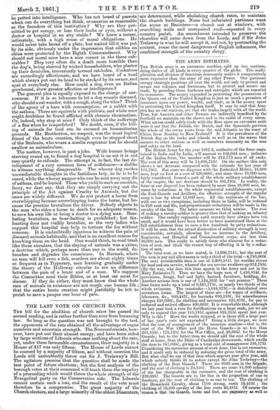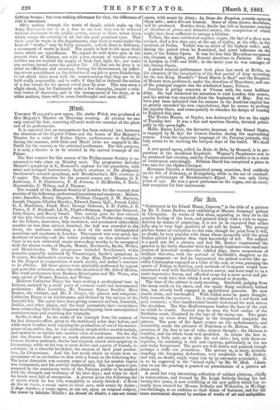THE ARMY ESTIMATES.
THE British army is an enormous machine, split up into sections, doing duties of all kinds in every quarter of the globe. This multi- plication and division of functions necessarily makes it comparatively more expensive than the army of any other Power. Our garrisons occupy strategic positions all over the world, not only to protect and secant our clines and fortresses, but to protect and secure our trade, by guarding those harbours and entrepOts which are essential to commerce. The money expended in protecting the possessions of i the Queen out of the United Kingdom s just as much a premium of insurance upon our power, wealth, and trade, as is the money spent
in protecting the United Kingdom itself. It may be said that Ame- rica has no out-stations, yet that she trades largely with all the world. True, but America and other Powers are indirectly benefited by the foothold we maintain on the shores and in the midst of every. ocean.
What nation could safely trade with the East upon an extensive scale were it not that the British, the Dutch, and the Spaniards garrison the whole of the ocean route from the mid-Atlantic to the coast of China, from Bombay to New Zealand? It is the prevalence of the British flag on the rocks and islands as well as on the waves that secures to other nations as well as ourselves immunity on the seas and safety on the land.
The British Army for the year 1861-2, exclusive of the force main- tained in India and by India, will amount to 146,044 men ; inclusive of the Indian force, the number will be 212,773 men of all ranks. The cost of this army will be 14,606,7511. On the surface this only shows a net decrease compared with the estimate for last year of 185,7951. But since we dispense with the Embodied Militia, 16,000 men, kept on foot at a cost of 320,0001., and since these 16,000 men, fairly considered, formed a part of the whole military establishment of the empire, the net decrease should be 405,795/. In reality, the force at our disposal has been reduced by more than 16,000 men, be- cause by reductions in the whole regimental establishments, except the Foot Guards and Artillery, the effective strength of the regular army is less by about 15,000 men. All the regiments of the line, with one or two exceptions, including those in India, will be reduced to 950 rank and file, and proportionate reductions will be made in the cavalry of the line. The latter measure we think unwise. The cost of making a cavalry soldier is greater than that of making an infantry soldier. Our cavalry regiments until recently have always been too small, and it would have been better to have maintained them at the full establishment than to save a few hundreds by petty reductions. It will be seen that the actual diminution of military strength is very considerable, certainly, allowing for an increase in the Artillery, Engineers, and Hospital and Commissariat corps, not less than 30,000 men. This ought to satisfy those who clamour for a reduc- tion of cost, and think the easiest way of effecting it is by a reduc- tion of men.
The total cost, as we have stated, is 14,606,7511., but the cost of the men in pay and allowances is only a third of the total-4,780,0001. The next considerable item is one of 2,200,5811. for warlike stores for land and sea service, whereof the sea service swallows up 912,7861. (By the way, why does this item appear in the Army and not in the Navy. Estimates?) Then we have the large sum of 1,456,8341. for provisions, forage, fuel and light, barrack furniture, bedding, &c. Another serious item is one of 1,124,363/. for "out pension." These four items make up a total of 9,561,7784, or nearly two-thirds of the whole estimates. The remainder-5,044,9731.—is distributed over seventeen items. The largest of these are—for wages of artificers, labourers, &c., 860,4171., for barracks 690,1591., for miscellaneous charges 648,0961., for clothing and necessaries 525,4161., for pay to reduced and retired officers 490,669/. It is remarkable that, although we last year took a vote for fortifications on a large scale, yet we are only to expend this year 158,185/. against 595,3551. spent last year. Why is this? Have the works stopped, or is there still a large part of last year's vote not expended ? Going a little deeper, we note that the cost of management of the immense machine—that is, the cost of the War Office and the Horse Guards—is no less than 201,833!.: 175,1381. for the War Office, and, 26,695/. for the Horse Guards; but to the latter item we should add the cost of the whole staff at home, from the Duke of Cambridge downwards, which swells the item to 161,035/., giving as a total cost of management 336,173/. Considering the enormous amount of work done, this is not exeessive, and it could only be reduced by reducing the gross total of the army. But what shall we say of that item which appears year after year, and which nobody thinks fit to notice except Sir John Trelawn,y—the clothing of the Foot Guards ? There are 6000 men in the brigade, and the cost of clothing is 24,850/. There are some 86,000 infantry- of the line chargeable in the estimates, and the cost of clothing is 239,6981. The Guards are to the line in the proportion of one to fourteen, yet the cost of clothing is as one to ten. The clothing of the Household Cavalry, about 1100 strong, costs 10,4191.; the clothing of 10,200 cavalry of the line costs 40,4811. Of course the reason is that the Guards, horse and foot, are pageantry as well as
fighting troops ; but even making allowance for that, the difference of cost is enormous.
After wading through the waste of details which make up the Army Estimates, one is at a loss to see how they can be reduced without detriment to the public service, except in those minor items which escape the scrutiny of all but the most practised eyes. That there must be waste in the departments, that there is waste under the head of "works," may be fairly assumed; indeed, there is Alderney, a monument of waste in itself. The puzzle is how to hit upon those items which are superfluous. We cannot do with fewer men in the present state of Europe, nor with a less amount of warlike stores ; neither can we restrict the supply of food, fuel, light, &c., nor make any serious inroad upon the pension list. All that can be done is to insist on efficiency and economy, forcing the Government, by inflict- ing severe punishment on the detection of any job or gross blundering, to set about their work with the consciousness that they are to be held really responsible, and to suffer if they fail or defraud the nation of a due return for the money voted year by year. This may seem a slight check, but let Parliament make a few examples, inspire a salu- tary terror of discovery, and in the management of the army, as in other matters, there will be more forethought and more skill.































 Previous page
Previous page